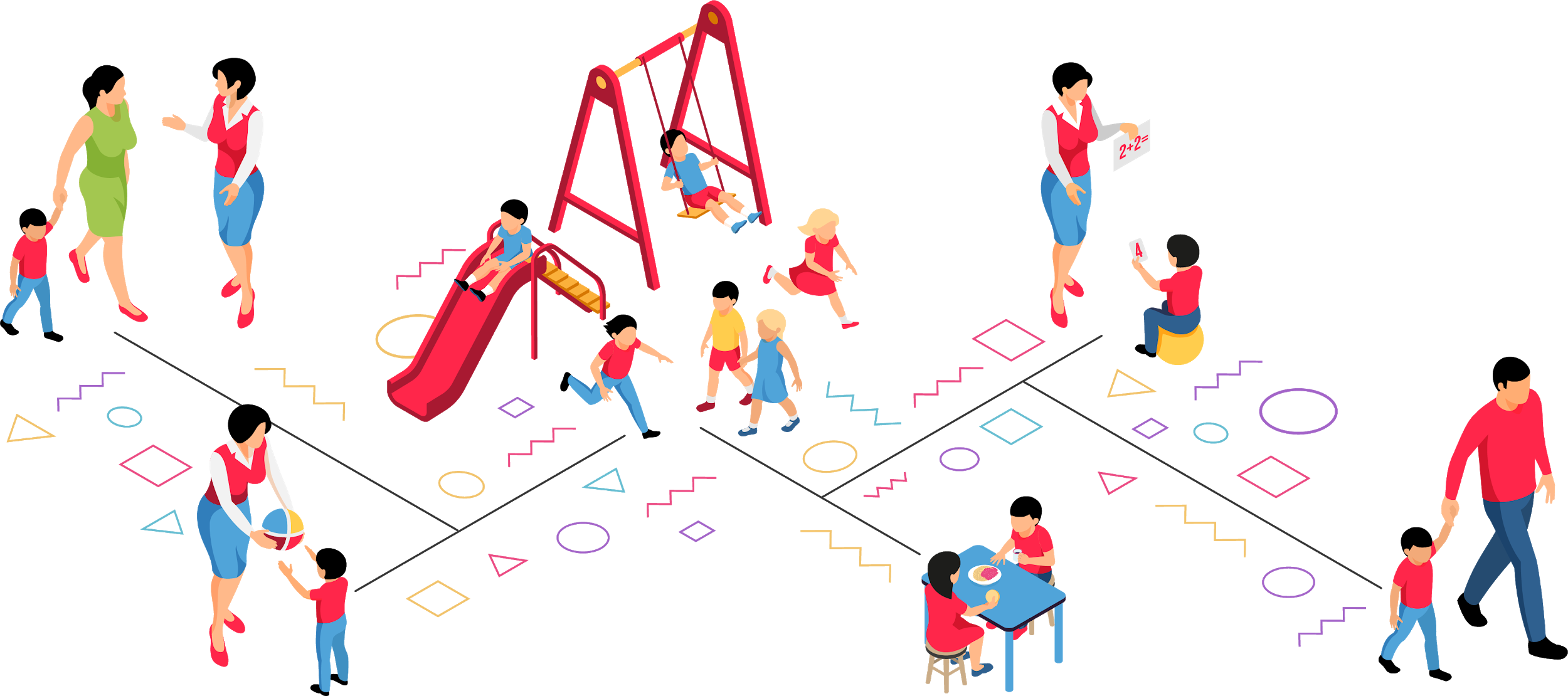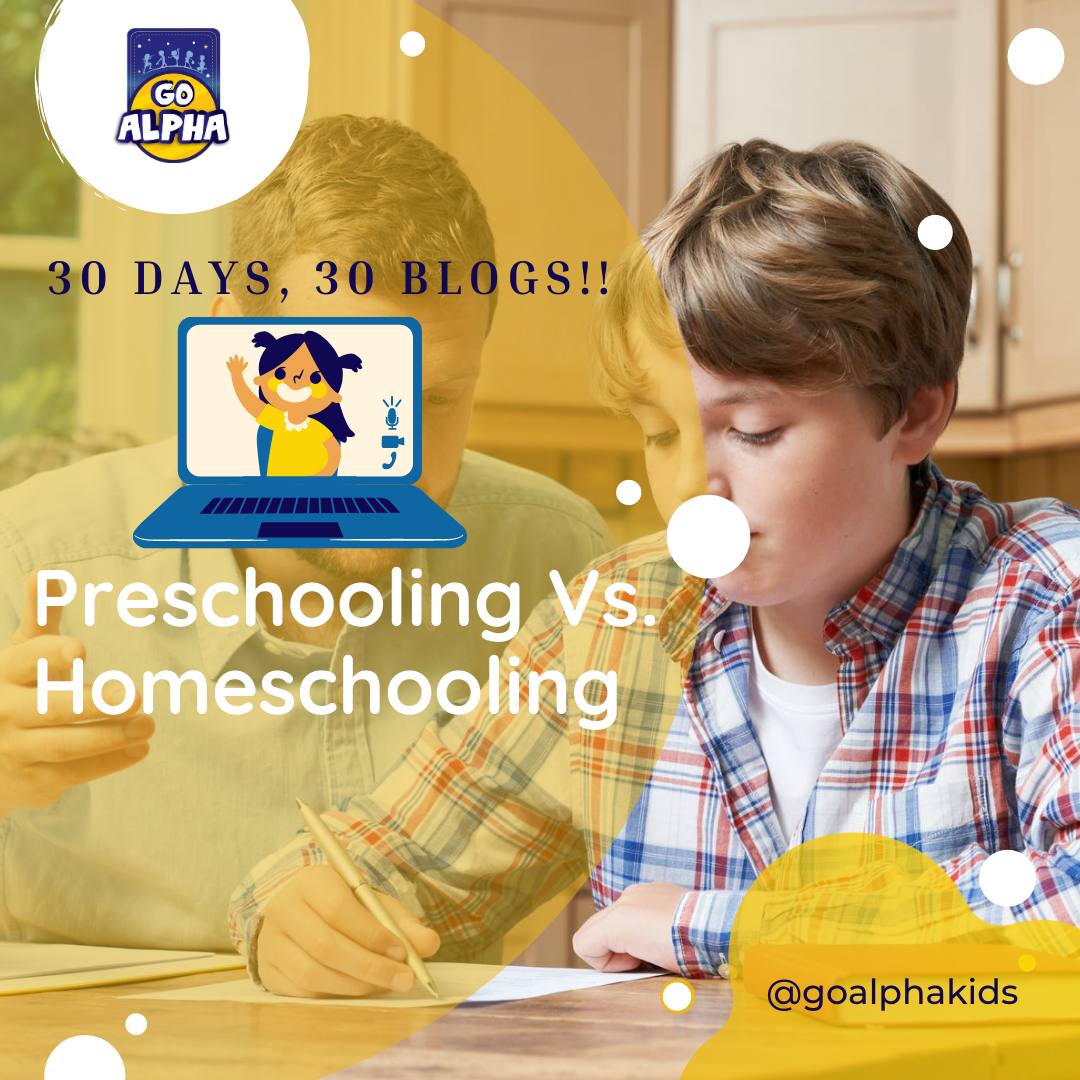



Parents, when starting with their child’s educational journey either wish to engage with them in the comfort of their homes or choose to enrol their kids in a pre-school that would provide their child with the best values and resources for growth. Before settling down on an option, it is necessary to consider the learning pattern your child adapts to the best, and plan a course of action that will benefit them the most in the long run.
With the increased competition in society, a lot of parents consider enrolling their children into good pre-schools with the idea of getting a ‘head-start’ in their education. The main idea is generally academic progress and early societal engagement.


Attending regular schools provides the child with a proper learning environment and scheduled hours. The children learn to form routines and a proper guideline is provided in terms of the end goal of a particular curriculum and continuous evaluation of the child’s performance. The school set up ensures that the child learns and develops in a manner that allows them to become a well-adjusted member of society.
Teachers monitor classroom speech on regular basis and provide timely intervention to ensure proper development of speech and vocabulary. The teachers can communicate their expectations to both the parent and the child and can ensure that the child is capable enough to communicate efficiently in their day-to-day lives and isn’t hesitant while expressing their ideas and thoughts.
Children work together and interact in a guided setup where they can talk, see and feel every single aspect of society as a social being. As the child mingles with their peer group, they experience several social situations that help them be warier of the different opinions and value systems that exist in the society, and they can learn to appreciate diversity from the very beginning.
As the child enters a classroom, they get to see people that are different from them, from the very basic dressing style to behavioural patterns, the child gets to see and observe the different kinds of culture and value systems and it helps them break free from the rigidity of a particular idea of existence, as they get to explore and interact with people from all backgrounds.
Regular social interaction helps the child become active and alert in general, and as a result, the child becomes more confident and can communicate with their peer groups and adults alike, without hesitation or fear.
Several activities require group work, this fosters a communal feeling among children and they learn how to work together. Working in a group helps develop a multi-perspective approach, as the children can analyse the same problem from different angles.
Children find themselves in a brand-new environment when they start pre-school, this can often lead to early childhood stress and they can also experience separation anxiety. Parents also force their kids to attend school and this can lead to outbursts and the child can end up feeling neglected emotionally.
The teacher’s attention is divided amongst the children, and catering to individual needs is a difficult task. Some children often struggle to cope up with the demanding material and as a result. The teachers generally miss out on such problems as they generally tend to focus on the completion of the syllabus.
The child has to deal with a lot of pressure from a very early age. The schools try to include several attractive elements in their curriculum to fulfil the expectations of the parents, this instils a fear of learning in most of the children from the very beginning.
Social interaction is an important part of the entire learning process, but it can also lead to several problems, for instance, bullying. Entitlement in young ones leads to attitude problems that cause several instances of hostile behaviour in the classroom, verbal and physical abuse also causes issues in the classroom set up and can lead to maladjustment issues and even hindered mental growth of the child in the long run.
The preschools’ pre-determined curriculum limits the room for exploration and binds the creative aspect to a structure that is rigid and regulated by strict expectations of the authorities. Creative freedom is thus bound to the school curriculum.
The lockdown introduced parents and children to a whole new world of possibilities, as they heard about the benefits of educating children at home. Although home-schooling is a perfectly viable choice, many parents remained cynical and wished for their children to return to school and ‘normalcy.’


The one-on-one time is high quality and caters to the needs of the child in a more holistic manner, as the child learns for the sake of learning and isn’t under the constant pressure of scoring better than their peers. Their progress and learning style are at the centre of the process of learning, and the child can easily adjust the amount of time being invested in learning a particular subject based on their interest or pace of learning.
Unlike a school computer lab, the in-home digital engagement of a child is more immersive and unique. There are no limitations to the kind of programs being taught or learned by the child. The number of online platforms has increased tremendously in the last few years, and the variety of the programs ensures that the child can stick with a program of interest instead of limiting themselves to the curriculum prescribed tools.
Homeschooling is more flexible as it gives a chance to both the parent and the child to explore and travel more. For instance, a child who is being home-schooled has the freedom to enjoy a museum visit in their own space and style, without worrying about the projects and field reports. Parents are more than willing to invest extra time and effort to ensure that their child’s interests and hobbies are explored in-depth along with them getting to learn experientially through hands-on learning
Home-school children tend to have a smaller friend circle, and they generally miss out on peer learning and as a result, they aren’t able to communicate with like-minded people and miss out on the opportunity of understanding the mindset of their age group. The child’s main source of information is their parent, and the information provided is mostly unrelatable.
The child primarily functions in the house, where all their basic needs are met, they do tend to miss out on a lot of group sports activities as their friend circle is relatively smaller, and the majority of public schools don’t allow home-schooled children to participate in the group-based activities that are organised from time to time.
The at-home learning system has its benefits as the child feels secure and comfortable, but sometimes the child ends up developing a rigid outlook on life, where they see the world from the lens of their parents’ glasses and aren’t as flexible when it comes to understanding the varied beliefs and ideas existing in the society.
Teaching at home can become a very generalised experience, the child might end up missing out on a lot of key developmental elements that are generally a mandatory part of regular school structures. For instance, a lot of the routine building takes place in the lives of both parents and child alike due to the fixed school timings, this helps children learn time-management and they also understand the basic functioning of the society in general.
The parents have an opportunity to work with a curriculum that is best suited to their child’s individual needs, but coming up with a schedule based around it can become tedious over time. If done without proper research, the child can miss out on a lot of key goals associated with the particular curricular framework.
In the end, it is the individual decision of the parent, based on their personal goals and schedules. The parents’ own experiences can have a significant impact on whether their child’s education. The education system has had various misconceptions associated with it. However, as we advance as a society, it is easier for both the parents and the schools to understand what works best for the children.
Ultimately, since every child is unique, it is important to work with them and determine what suits them.
For physical activity/ sports at home you can look at the multiple options that we provide at Go Alpha: Go Preschool
Image Source: Pexels
Written by Stuti
Please fill the form to get more information and set up a FREE Go Alpha Demo at your preschool.